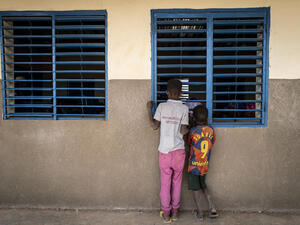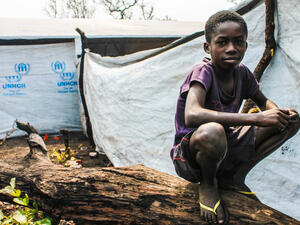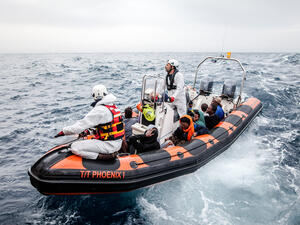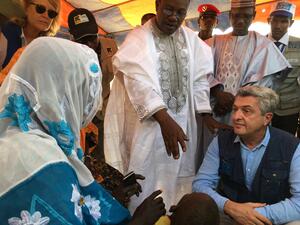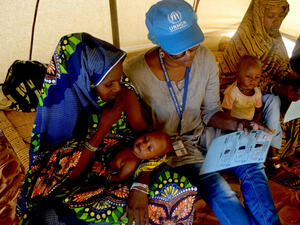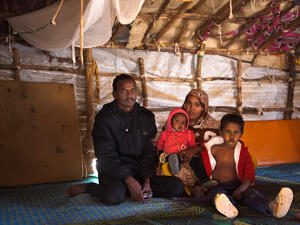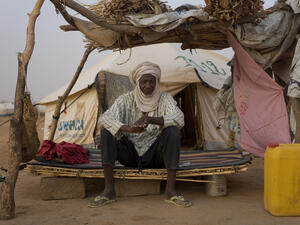UN refugee agency urgently reinforcing staff and resources for Mali
UN refugee agency urgently reinforcing staff and resources for Mali

Displaced children in the Mali capital, Bamako, eat a welcome meal.
DAKAR, Senegal, January 18 (UNHCR) - As military operations continue in northern Mali, the UN refugee agency is reinforcing its teams across the region to help up to 710,000 internally displaced people and refugees.
UNHCR's budget committee met in Geneva on Thursday to approve deployment of dozens of specialists, spokesperson Melissa Fleming said.
"In Burkina Faso, we have sent staff from Ouagadougou to monitor the border and to boost assistance in the refugee camps in Burkina's Sahel administrative region. Our new planning basis allows for additional displacement of up to 300,000 people inside Mali and 407,000 into neighbouring countries," she said.
As of Thursday, displacement across borders has been rising steadily - with 2,744 Malian refugees now having arrived in neighbouring countries since fighting and French air strikes started on January 10. Of these, 1,411 are in Mauritania while Burkina Faso has received 848 new refugees and Niger 485.
Including these numbers and those displaced since the Mali crisis started a year ago, there are now 147,000 Malian refugees in neighbouring countries (55,221 in Mauritania, 52,875 in Niger, 38,776 in Burkina Faso, an estimated 1,500 in Algeria, 26 in Guinea, and 20 in Togo).
At the same time, close to 229,000 people are now displaced inside Mali according to the Commission on Population Movements, including some 8,700 who have fled the north to safer areas. Most have headed to the capital, Bamako, like 28-year-old Aichatou from the Timbuktu region.
"I left my village on Sunday and arrived in Bamako on Tuesday. I left because of the bombing, I was afraid for my four children," she said. "I had to borrow US$60 to pay for transportation. I now live in Bamako, in my uncle's house and share a room with my four children and nine other people." He said there was no electricity or running water and he had to pay for medicine for his sick baby.
In Burkina Faso, a UNHCR team visited the entry point of Inabao on Wednesday, in Sahel region and only a few kilometres from the border with Mali. They found that some 265 Malian refugees had crossed in the past days from Intahaka, N'Tillit and Dorage towns and surroundings areas in the Gao area of northern Mali.
The refugees said they fled the recent military intervention, the lack of any means of subsistence, and fear of the strict application of Islamic law, or Sharia. They reported having witnessed executions and amputations, and mentioned that large amounts of money were being offered to civilians to fight against the Malian armed forces and its supporters.
According to the accounts from refugees there are children among the rebel fighters. People spoke of family members having disappeared.
Refugees are reaching Burkina Faso using public transportation, paying the equivalent of US$50 for the trip - for many, equivalent to more than a month's earnings. New arrivals are mainly ethnic Tuareg women and children. They said that more people, including their husbands and fathers, are on their way to Burkina Faso by foot, many using donkeys or local transport, and many bringing livestock with them.
Despite insecurity in northern Mali in recent months, they say that people have delayed fleeing Mali to allow the men to take care of businesses and animals.
Newly arrived refugees in Burkina Faso are being transported further inland to Goudebou camp, for their safety and because of proximity to the border. "For the same reasons, we are continuing relocation of people away from camps and sites at Ferrerio and Gandafabou," UNHCR's Fleming said.
Refugees are being moved to camps near the towns of Dori and Djibo. As of today, UNHCR has relocated 4,169 Malian refugees in 14 UNHCR convoys to camps near Dori and Djibo towns. Some 6,000 others remain to be moved.
In Niger, refugees who fled their homes last year and are staying in UNHCR-managed camps are saying that they are worried about family members who have remained in northern Mali, including in the Menaka, Anderamboukane and Ansongo areas.
Most of the new arrivals have been at the Mangaize and Tabareybarey camps, as well as in Banibangou and Tillia areas. Refugees say people in conflict areas are having difficulties leaving because of a lack of transportation. Truck drivers fear being mistaken by French aircraft for rebel groups moving from Mali to Niger.
Refugees say that hopes that the new military intervention will be shortlived are causing some to wait instead of fleeing. Meanwhile, UNHCR continues to provide help to the almost 53,000 refugees in camps and sites in Mangaize, Banibangou, Ayorou, Abala and Tillia areas.
Most of the newly arrived in Mauritania are from the central Mali areas of Lere, Lampara, Niafounke and Timbuktu. Most say they fled because of French air strikes against Islamist fighters, which spread panic as nobody was expecting them.
Some refugees fled their homes by foot, others went by car and some headed to the border and the Fassala transit centre by cart. The new arrivals are mainly Tuaregs, Arabs, Songhai and Bella and almost all are women and children, with some old people.
By Hélène Caux in Dakar, Senegal

